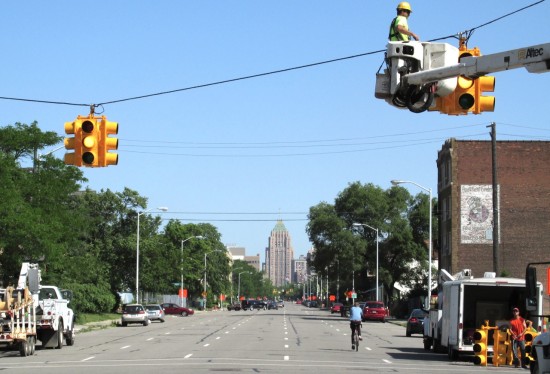
Given the severity and number of challenges facing Detroit, streetscape improvements might not seem like a very high priority. But in the Motor City’s Midtown, one of the city’s relatively resurgent neighborhoods, a local planning non-profit is betting that encouraging more bicyclists and pedestrians will be a boon for the area. As a result, Detroit may soon get its first buffered bike lanes. Between Temple Street and Warren Avenue, Midtown’s 2nd Avenue is the target of a substantial road diet, as first reported by ModeShift.
As Curbed Detroit put it, “The street is practically wide enough to land a jumbo jet, so carving up this turkey will provide cyclists and drivers with large portions of road,” creating a backbone for bike infrastructure between Wayne State University and the waterfront.
The 5-foot bike lanes would run for approximately one mile on both sides of 2nd Avenue, separated from 8-foot parking and 11-foot drive lanes by a 3.5-foot, diagonally striped buffer.
Midtown Detroit is pushing the diet as part of a larger campaign to repurpose a slew of extra-wide and outmoded one-way streets in the city’s central business district. City Council has already approved the larger project, which includes opening 2nd Avenue to two-way traffic. In 2012 work began on the “Midtown Loop,” which turned two downtown one-ways into two-way streets and made bike lanes out of car lanes in this district dense with cultural institutions and new downtown development.
ModeShift reports the project should cost $200,000 plus inspection fees. The Michigan Department of Transportation will oversee the work, which is expected to win some federal money. MDOT previously authorized $1 million for non-car “enhancements” along Cass Avenue in 2014.
As MDOT gears up to revamp I-375, alternative transportation advocates are pushing for green space and pedestrian-friendly accoutrements in the wake of the downtown highway’s car-centric legacy.